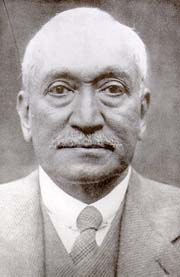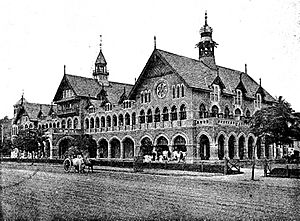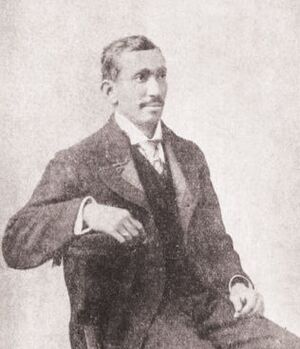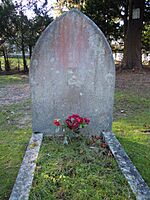Abdullah Yusuf Ali facts for kids
Quick facts for kids Abdullah Yusuf Ali |
|
|---|---|
 |
|
| Religion | Islam |
| Denomination | Sunni Islam |
| Personal | |
| Born | 14 April 1872 Bombay, Bombay Presidency, British India |
| Died | 10 December 1953 (aged 81) Fulham, London, England |
Abdullah Yusuf Ali (born April 14, 1872 – died December 10, 1953) was a British-Indian barrister, which is a type of lawyer. He wrote many books about Islam, including a very important explanation of the Qur'an. He supported Britain during World War I and was given an award called the CBE in 1917 for his help. He passed away in London in 1953.
Contents
Early Life and Education
Abdullah Yusuf Ali was born in Bombay, British India. His father, Yusuf Ali Allahbuksh, was a Sunni Muslim who became a Government Inspector of Police. He earned the title Khan Bahadur for his public service.
As a child, Abdullah Yusuf Ali went to the Anjuman Himayat-ul-Islam school. He later studied at Wilson College in Bombay. He also had a strong religious education. He learned to recite the entire Qur'an from memory. This means he knew the whole holy book by heart! He was fluent in both Arabic and English. He focused on studying the Qur'an and its early commentaries.
In January 1891, at age 19, Ali earned a top degree in English Literature from the University of Bombay. He then received a special scholarship to study at the University of Cambridge in England.
Studying Law and Early Career
Ali first traveled to Britain in 1891 to study law at St John's College, Cambridge. He earned his law degrees in 1895. That same year, he returned to India to work in the Indian Civil Service (ICS). He later became a barrister in 1896.
He returned to Britain in 1905 for a two-year break from his job. During this time, he became a Fellow of the Royal Society of Arts and the Royal Society of Literature. Ali became well-known in Britain after giving a lecture in London in 1906. He also held important positions in the Finance Department of the Government of India.
Career and Contributions
In 1914, Ali left the Indian Civil Service and settled in Britain. He became a trustee for the Shah Jehan Mosque in Woking. In 1921, he also became a trustee for the fund to build the East London Mosque.
When World War I began, Ali strongly supported India's help in the war. He wrote articles, gave speeches, and went on a lecture tour. For his efforts, he was awarded the CBE in 1917. In the same year, he started teaching Hindustani at the School of Oriental Studies.
Ali was a respected thinker in India. Sir Muhammad Iqbal asked him to be the Principal of Islamia College in Lahore. He served in this role from 1925 to 1927 and again from 1935 to 1937. He was also involved with the University of the Punjab.
His Famous Works
Abdullah Yusuf Ali wrote several books, including Muslim Educational Ideals (1923) and Fundamentals of Islam (1929). However, his most famous work is his English translation and commentary of the Qur'an. This work is called the Holy Qur'an: Text, Translation and Commentary (published 1934–1938). It is still one of the most widely used English versions of the Qur'an today.
In 1928, he was part of the Indian group that attended the League of Nations Assembly.
Later Years
In December 1938, Ali helped open the Al-Rashid Mosque in Edmonton, Alberta, Canada. This was the third mosque in North America.
In 1947, after India gained its independence, Ali returned to India. However, this move was not successful for him. He later returned to London. In his final years, he became increasingly unwell.
On December 9, 1953, Ali was found by the police in Westminster. He was taken to a hospital and then to a home for the elderly. He passed away alone on December 10, 1953, after a heart attack.
No family members claimed his body. The Pakistan High Commission arranged his funeral. He was buried in the Muslim section of Brookwood Cemetery near Woking.
Ali's Quran Translation
There have been many printed versions of Abdullah Yusuf Ali's Qur'an translation, around 30 in total. Some later versions have been changed from his original text. For example, in Saudi Arabia, a state-sponsored group has modified his translation. Researchers have looked at different printings to see if they still match Ali's original understanding of the Arabic text. They have found that some changes have been made over time.
Images for kids
 | Aaron Henry |
 | T. R. M. Howard |
 | Jesse Jackson |





